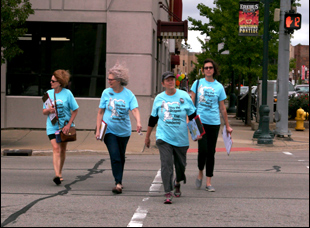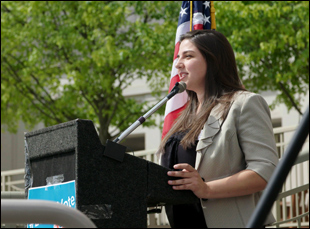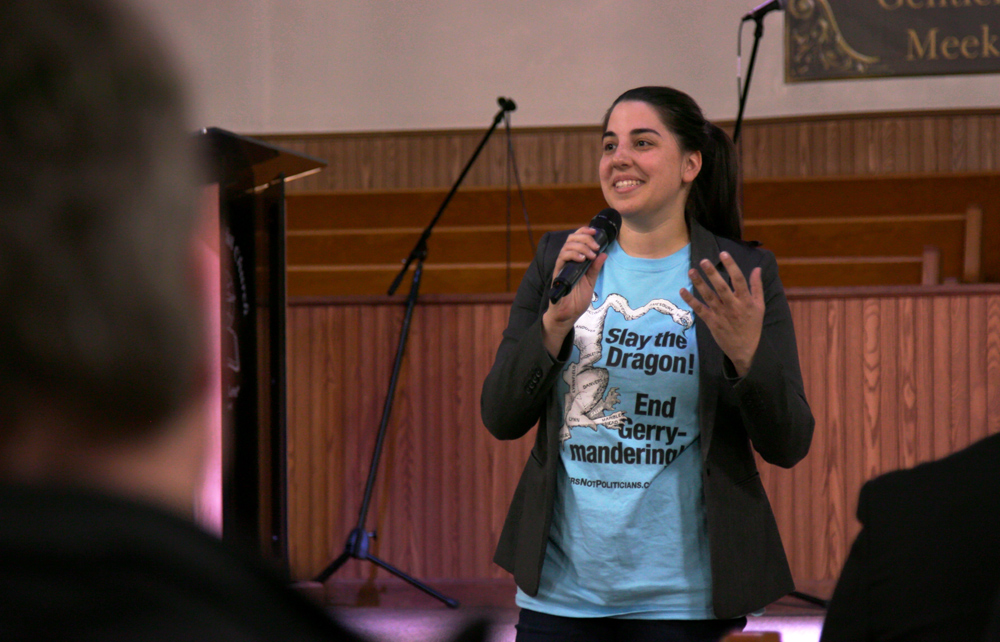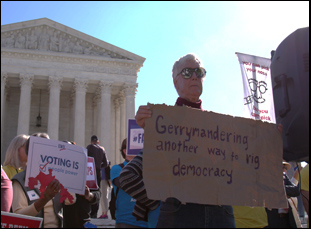“It’s a system that allows legislators to pick voters rather than voters pick the legislators,” laments former Wisconsin State Senator Dale Schultz in Chris Durrance and Barak Goodman’s eye-opening new film “Slay the Dragon,” watching his home state move to the extreme right after the maps for voting districts had been redrawn in 2010 when by any measure in the past, it was evenly divided between Republican and Democratic voters. Schultz, a Republican, had not been let in to the offices across the street from the state capitol where out-of-state operatives had carved up Wisconsin into territories that assured a Republican majority for the decade that followed, but he winced upon seeing the fallout, an unprecedented attack on collective bargaining in a place where labor unions had long been a strong point of pride.
While gerrymandering can be an arcane subject, Durrance and Goodman vividly show its insidious cause and effect in “Slay the Dragon,” tracing America’s increasing political divisions to how states are divvied up every 10 years when district maps are created, affirmed by the state legislature that’s in power at the time. Once an afterthought based on census results, there’s been growing recognition of how elections can be predetermined by isolating certain voting blocs from others, inspiring nonsensical district lines that make perfect sense for building a majority that can go virtually unchallenged and emboldened to pass policies that don’t reflect the communities they serve and appeal primarily to the most radical reaches of their party.
As “Slay the Dragon” outlines, Republicans adopted this as a nationwide strategy following the election of Barack Obama in 2008, targeting swing states in an effort known as Project Redmap, and after offering a zippy history of how we got here, the film evolves into an inspiring story of constituents fighting to make their vote matter again, embedding with the Wisconsin law firm handling Gill v. Whitford, a potentially game changing case that was selected for the Supreme Court to consider partisan gerrymandering and heads east to Michigan where a young activist named Katie Fahey launches the “Voters Not Politicians” campaign to get a measure on the ballot that would end the practice in the state, following ample evidence of the havoc its wreaked in how state legislators without any fear of losing their next elections failed to address the water crisis in Flint.
Horrifying and occasionally hilarious due to the absurdity of a political reality so far removed from the original intent of the founding fathers’ ideas of representative government, “Slay the Dragon” delivers a clear-eyed view at an electoral process that is in greater peril than ever before and following a celebrated festival run that began last spring at Tribeca, the film arrives this week on VOD and Durrance and Goodman shared how they became interested in the subject and were able to turn it into such compulsive viewing, as well as structuring such a sprawling story and how the current pandemic has reinforced the film’s importance.
Barak Goodman: Back to 2016, I was was coming off that election reeling, like a lot of us, and trying to figure out just for my own curiosity and sanity what had happened and why the country ended up in such a polarized and dysfunctional political state. I was reading as much as I could and came across this amazing book, “Ratfucked” by David Daley, who’s a primary interview in our film. That book was a deep piece of reporting on gerrymandering, which I knew very little about, and really explained a lot for me personally about how a little known political strategist had come upon this device, this political dirty trick, to really rig the system in a deeply pernicious way [and led] to gridlock. We went to David and got his cooperation to make a film and we were off and running.
Did David’s book actually lend itself to ideas about how to turn this into a movie? It’s a pretty abstract concept to visualize.
Chris Durrance: We spent a lot of time early on, thinking well what is the real world impact, because gerrymandering, as Barak says, is something that we knew very little about, and I think we had that in common with the rest of the country. You have a census every 10 years and then the redistricting is done in secret and most people have this sense that [gerrymandering] was done in the past and it’s [addressed] in Poli Sci courses, but not really anything that impacted us, so once we started with Dave’s book as a roadmap, we took a deep dive in the states where this had been done most perniciously – Wisconsin, Michigan, North Carolina. You could see it in spades, but few people at the time were drawing a connection between this hyper-partisan environment and the gerrymandering that had been done in those states.
When you look at Flint [or] the bathroom bill in North Carolina [or] the legislation pouring out of Wisconsin under Scott Walker, people are taking these as isolated cases. They weren’t pulling it all together, so that was really important for us. Then we looked at the pushback [against gerrymandering] because we’re now into 2016 and people are pushing back against what had happened in 2010, 2011 with Project Redmap and that’s how we found Katie Fahey in Michigan.

Barak Goodman: Yeah, there was a natural inclination at first to structure it by state. Each state’s story is so complicated on its own. We were wrestling all the way through with the complication of this. Not only did we have to get across this sort of civics lesson of gerrymandering and how it works or doesn’t work, but we also had the particular ins and outs of each state’s story to tell, so the simplest thing initially was to look at what happened in North Carolina because of all the history there and the complication around various lawsuits, [which was the] same with Wisconsin and same with Michigan.
We really wanted a story we could follow [through the whole film], or more than one story, and David’s book was all retrospective, but we wanted to be on the ground and to follow characters, so we actually started with the group of out of Wisconsin, the legal team behind the Whitford lawsuit, especially Nick Stephanopoulos and Ruth Greenwood, the married couple who are the lead protagonists of that case. We started to follow them initially, but then we found Katie who was at the state level in Michigan and from the moment we met her, we felt this every woman story, no matter how it was going to turn out, was going to be almost a referendum on democracy, a true grassroots effort to seize back democracy from the worst case of gerrymandering that we’d seen by a small cabal of not even elected officials. Katie just kept pushing herself into the film. That story was so dramatic and was such a draw it kind of told us what the structure of the film should be. We needed her and it to be our A story that people could latch onto and care about so that the other stuff would be interesting, [because] it was really going to be a perfect paradigm for whether or not our democracy is capable of functioning. It sounds high-falutin’, but that’s what the stakes were in that fight in Michigan, so it was a natural drama to watch unfold on camera.
Chris Durrance: Yeah, you could watch the evolution of the cuts and if you can step back, you can just see [Katie] moving closer and closer to the beginning of the film and as Barak said, it was the purest form of democracy up against the greatest perversion of democracy that we’ve seen in the U.S.
One of the things that I thought was interesting for a number of reasons is how you’ll see some of the interviewees in the film refer to specialists in the field as if they were sports stars, which was a great way to put them into an understandable context, but troubling in how that seemingly reduces this to a game – is it difficult to keep a human perspective on this?
Chris Durrance: At every stage, whether it’s Chris Jankowski, the architect of Project Redmap, or it’s Ari Berman or Dave Daley taking us through it, we’re trying to find characters and stories and ways of bringing this to life, so it does resonate with people. Even some of the people that didn’t give us interviews – Thomas Hoeffler, I’m thinking of, this master mapmaker, I think we still found a way of making him a presence in the film and to bring home who he was an his motivations. For us, that was just a way of taking it out of the classroom and onto the screens. A lot of work went into the graphics, just trying to think how do we make this interesting? How do we make it a film rather than a screed?
Barak Goodman: Yeah, and I do think these gerrymanderers are so removed from the consequences of their actions that is almost like a game to them, like a puzzle that they can manipulate the maps to the Nth degree to favor their own clients, so it was very important for me and Chris to show the real world consequences of gerrymandering. This is not just done in the backroom on a computer and then it has no ramifications. This has the most direct kind of effect on every one of us because so much of our lives are dictated by the laws and rules set by local governments and state legislatures and in Congress even where gerrymandering has an enormous effect. So we live under the tyranny of this anti-democratic process and that’s why we went with Flint as the opening story in the film to really try and bring that home right from the beginning.

Chris Durrance: It’s been interesting. We had a great festival run with Tribeca and Traverse City and lots of other places and to be honest, we generally make stuff for TV, so it feels like a second life that it’s had and then the pandemic came and it was disappointing in terms of the release of the film. We had to delay it. But Magnolia, the distributor, and Participant have been hugely supportive all along and now as people start talking about the election and realizing that we’re in the middle of a census year and redistricting is going to happen, come what may, it feels all the more pertinent and timely that there should be a spotlight on the ability to vote and on redistricting and gerrymandering. It couldn’t be more important to hold our elected representatives’ feet to the fire, so I hope it finds an audience now.
Barak Goodman: Yeah, this pandemic will pass, but what it will remind everyone of is the importance of a functioning government on a local level and on a national level and that a government needs to be responsive to the people. It needs to be competent, it needs to be connected, that it can’t be operating for itself or for its own particular, peculiar agenda. Democracy is never more important than when something like this happens and that’s evident to everybody now – on the right and the left, so I hope when this passes, that there will be a refocusing on the institutions of government, the way that they’re functioning or not functioning and that our film will have its moment since gerrymandering is very much part of that conversation.
“Slay the Dragon” is now available on demand and on iTunes, Amazon, and Google Play, among others. A full list is available here.





